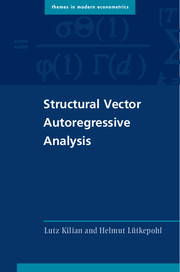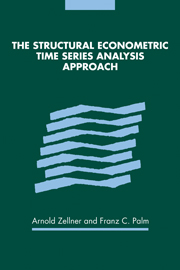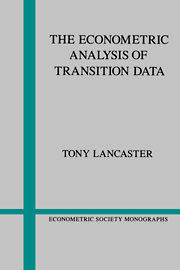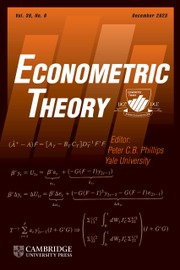Structural Vector Autoregressive Analysis
Part of Themes in Modern Econometrics
- Authors:
- Lutz Kilian, University of Michigan, Ann Arbor
- Helmut Lütkepohl, Freie Universität Berlin
- Date Published: January 2018
- availability: Available
- format: Hardback
- isbn: 9781107196575
Hardback
Other available formats:
Paperback, eBook
Looking for an inspection copy?
This title is not currently available on inspection
-
Structural vector autoregressive (VAR) models are important tools for empirical work in macroeconomics, finance, and related fields. This book not only reviews the many alternative structural VAR approaches discussed in the literature, but also highlights their pros and cons in practice. It provides guidance to empirical researchers as to the most appropriate modeling choices, methods of estimating, and evaluating structural VAR models. The book traces the evolution of the structural VAR methodology and contrasts it with other common methodologies, including dynamic stochastic general equilibrium (DSGE) models. It is intended as a bridge between the often quite technical econometric literature on structural VAR modeling and the needs of empirical researchers. The focus is not on providing the most rigorous theoretical arguments, but on enhancing the reader's understanding of the methods in question and their assumptions. Empirical examples are provided for illustration.
Read more- Provides a comprehensive and up-to-date treatment of the topic, allowing readers to find all related methods in one source
- Bridges the gap between the technical structural vector autoregressive (VAR) literature and the needs of empirical researchers
- Shows the pros and cons of specific structural (VAR) methods, allowing empirical researchers to decide on the most appropriate methods for their analysis
Reviews & endorsements
'The book by Kilian and Lütkepohl will become the new benchmark textbook for teaching structural vector autoregressive analysis. This book thus devotes considerable space to the issue of identification, including sign restrictions, to Bayesian methods, to Factor Vector Autoregressions and to non-fundamental shocks. These are key to understanding much of recent research. The authors do an excellent job of assembling and lucidly explaining it all. This book is destined to become a classic.' Harald Uhlig, University of Chicago
See more reviews'Structural vector autoregressions (SVARs) are an essential tool in empirical macroeconomics. This book provides a thorough and long-overdue digest of a literature that has been thriving for over 35 years and seen a lot of exciting developments in the past decade. The authors masterfully blend theoretical foundations, guidance for practitioners, and detailed empirical applications. This is a must-read for anyone working with SVARs.' Frank Schorfheide, University of Pennsylvania
Customer reviews
Not yet reviewed
Be the first to review
Review was not posted due to profanity
×Product details
- Date Published: January 2018
- format: Hardback
- isbn: 9781107196575
- length: 754 pages
- dimensions: 235 x 157 x 45 mm
- weight: 1.14kg
- contains: 40 b/w illus.
- availability: Available
Table of Contents
1. Introduction
2. Vector autoregressive models
3. Vector error correction models
4. Structural VAR tools
5. Bayesian VAR analysis
6. The relationship between VAR models and other macroeconometric models
7. A historical perspective on causal inference in macroeconometrics
8. Identification by short-run restrictions
9. Estimation subject to short-run restrictions
10. Identification by long-run restrictions
11. Estimation subject to long-run restrictions
12. Inference in models identified by short-run or long-run restrictions
13. Identification by sign restrictions
14. Identification by heteroskedasticity or non-gaussianity
15. Identification based on extraneous data
16. Structural VAR analysis in a data-rich environment
17. Nonfundamental shocks
18. Nonlinear structural VAR models
19. Practical issues related to trends, seasonality, and structural change
References
Index.
Sorry, this resource is locked
Please register or sign in to request access. If you are having problems accessing these resources please email [email protected]
Register Sign in» Proceed
You are now leaving the Cambridge University Press website. Your eBook purchase and download will be completed by our partner www.ebooks.com. Please see the permission section of the www.ebooks.com catalogue page for details of the print & copy limits on our eBooks.
Continue ×Are you sure you want to delete your account?
This cannot be undone.
Thank you for your feedback which will help us improve our service.
If you requested a response, we will make sure to get back to you shortly.
×






